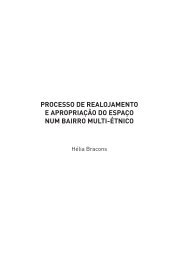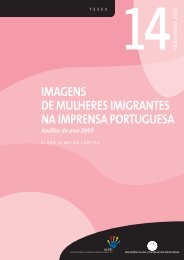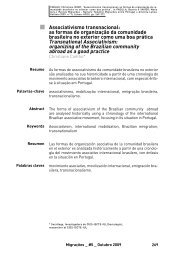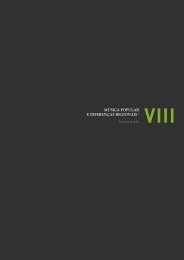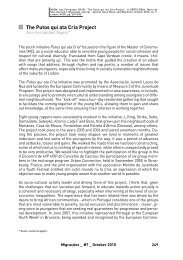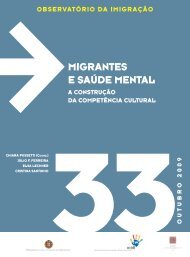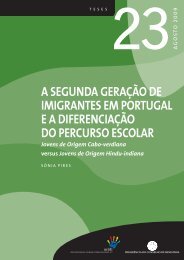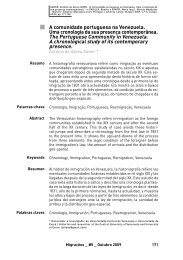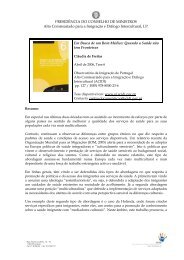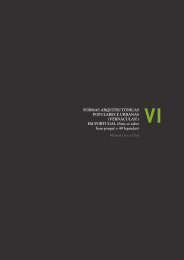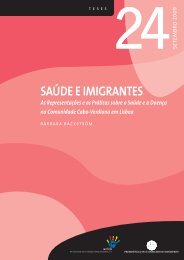<strong>Revis<strong>in</strong>g</strong> <strong>citizenship</strong>: <strong>migration</strong> <strong>and</strong> <strong>fado</strong> <strong>in</strong> <strong>the</strong> <strong>play</strong><strong>of</strong> <strong>identities</strong> <strong>in</strong> <strong>the</strong> United StatesMaria de São José Côrte-RealIntroductionThe Gr<strong>and</strong>e Noite de Fados, regularly performed among Portuguese migrants <strong>in</strong> <strong>the</strong>US, <strong>in</strong>cluded d<strong>in</strong>ner, musical performance <strong>and</strong> nationalist memory. I studied it, not<strong>in</strong>g<strong>the</strong> systematic retention <strong>of</strong> musical models <strong>in</strong> performance. I compared it with whathappened <strong>in</strong> Lisbon, through repertoire analysis; observation <strong>of</strong> perform<strong>in</strong>g details,sound material, voice character <strong>and</strong> <strong>in</strong>dividual gesture among o<strong>the</strong>r expressive behaviourpatterns visible among musicians, artists <strong>and</strong> audiences; analysis <strong>of</strong> <strong>in</strong>dividualop<strong>in</strong>ions <strong>and</strong> critical <strong>in</strong>formation held by performers as well as some members <strong>of</strong> <strong>the</strong>audiences. Fado celebrated <strong>the</strong> past, <strong>in</strong> a settled tradition <strong>of</strong> national representation.Someth<strong>in</strong>g however constra<strong>in</strong>ed <strong>the</strong> ambience suggest<strong>in</strong>g frustration. Marg<strong>in</strong>al <strong>the</strong>n,this strangeness is now at <strong>the</strong> centre <strong>of</strong> my <strong>in</strong>terest. What behaviours revealed thissensation? Were <strong>the</strong>y frustrated? What might <strong>the</strong> causes be? How did <strong>the</strong>y manifest<strong>the</strong>m? Why would <strong>the</strong>y experience that? Might <strong>the</strong> feel<strong>in</strong>g be productive?After study<strong>in</strong>g cultural policy <strong>and</strong> musical expression <strong>in</strong> <strong>the</strong> transition from dictatorshipto democracy <strong>in</strong> Portugal, where <strong>fado</strong> emerged as a constructed musical categoryfor / from nationalistic purposes (Côrte-Real, 2000), it became clear to me whyparticipants seemed divided <strong>in</strong> <strong>the</strong>ir feel<strong>in</strong>gs, rais<strong>in</strong>g <strong>the</strong> sensation I termed frustration.Disparate identity forces were <strong>play</strong><strong>in</strong>g <strong>in</strong> a way that <strong>the</strong> planned nationalistdemonstration vacillated before <strong>the</strong> <strong>in</strong>terpretive experience <strong>of</strong> performance. Welfare,attention to <strong>the</strong> o<strong>the</strong>r, happ<strong>in</strong>ess <strong>and</strong> critical awareness, among o<strong>the</strong>rs, prevail<strong>in</strong>gover nationalist notions stress<strong>in</strong>g sadness, lonel<strong>in</strong>ess, submission <strong>and</strong> jealousy, producedeffect. I propose an <strong>in</strong>terpretation <strong>of</strong> <strong>the</strong> event not<strong>in</strong>g <strong>the</strong> role <strong>of</strong> <strong>the</strong> behaviours<strong>in</strong> performance <strong>and</strong> <strong>the</strong> multifarious forces deal<strong>in</strong>g with <strong>in</strong>dividual identity to stress<strong>the</strong> importance <strong>of</strong> musical performance <strong>in</strong> <strong>the</strong> representation <strong>and</strong> <strong>in</strong>terpretation <strong>of</strong><strong>citizenship</strong>.M<strong>in</strong>d <strong>and</strong> body <strong>in</strong> performance …Wrapped <strong>in</strong> white blankets disposed side by side <strong>in</strong> several rows <strong>the</strong>y left a narrowcentral path. It was Penn Station <strong>in</strong> New York pass<strong>in</strong>g 4 a.m. on 25.03.1990. Homelesspeople used <strong>the</strong> sheltered hallway to sleep. Inhabitants <strong>of</strong> <strong>the</strong> city, bodies<strong>and</strong> <strong>the</strong> respective quiet m<strong>in</strong>ds, gave <strong>the</strong> public place a new use. 1M<strong>in</strong>d <strong>and</strong> body reactions <strong>in</strong> <strong>the</strong> public place emerge <strong>in</strong> this study on music performance<strong>and</strong> <strong>citizenship</strong> representation. Complex networks <strong>of</strong> memory <strong>in</strong>teract with newsocial circumstances shap<strong>in</strong>g <strong>the</strong> <strong>play</strong> <strong>of</strong> <strong>identities</strong> that migrant, <strong>and</strong> non-migrant,populations live everyday. Increas<strong>in</strong>g <strong>migration</strong> <strong>in</strong>tensifies <strong>in</strong>ter <strong>and</strong> <strong>in</strong>trapersonalrelationships. The experience <strong>of</strong> displacement, enriched by contact with novelty,74 Music <strong>and</strong> Migration
challenges established canons <strong>and</strong> leads us to question <strong>and</strong> rebuild ways <strong>of</strong> life. Thereference to <strong>the</strong>“global village <strong>in</strong> which we all live” requires reflection on <strong>the</strong> validity<strong>of</strong> <strong>the</strong> dist<strong>in</strong>ction <strong>of</strong> <strong>citizenship</strong> <strong>of</strong> national base. It is my aim to argue for <strong>the</strong> study <strong>of</strong>music among migrants, <strong>and</strong> <strong>fado</strong> performance <strong>in</strong> particular, to observe nuances <strong>and</strong>mean<strong>in</strong>gs <strong>of</strong> identity as a multipart perform<strong>in</strong>g, fluid <strong>and</strong> adaptable human characteristic,operat<strong>in</strong>g on <strong>in</strong>dividual <strong>and</strong> collective dimensions <strong>of</strong> each one’s life.Music performance is a multifaceted <strong>and</strong> dynamic human phenomenon, <strong>in</strong>volv<strong>in</strong>g ra<strong>the</strong>rcapricious <strong>and</strong> sometimes <strong>in</strong>tellectually elaborate, physical, aes<strong>the</strong>tical, social<strong>and</strong> symbolic dimensions, challeng<strong>in</strong>g barriers, amplify<strong>in</strong>g <strong>the</strong> voice <strong>of</strong> its producers<strong>and</strong> touch<strong>in</strong>g its receivers. It rends itself particularly effective for an <strong>in</strong>terpretive observation<strong>of</strong> <strong>citizenship</strong> representation <strong>in</strong> <strong>the</strong> <strong>in</strong>tercultural arena. In an approach to<strong>the</strong> concept <strong>of</strong> identity, acknowledg<strong>in</strong>g its fluidity <strong>and</strong> perform<strong>in</strong>g character (Hall <strong>and</strong>du Gay, 1996; Baumann, 1996), I present a Portuguese Night also billed as <strong>the</strong> Gr<strong>and</strong>Night <strong>of</strong> Fados <strong>in</strong> Newark, <strong>in</strong> 1990. Material for purposes <strong>of</strong> reference was collected <strong>in</strong>Lisbon, <strong>in</strong> <strong>the</strong> context <strong>of</strong> <strong>fado</strong> performances for tourists <strong>in</strong> <strong>the</strong> restaurants Adega Machado,which closed <strong>in</strong> 2009 after 72 years <strong>in</strong> bus<strong>in</strong>ess, <strong>and</strong> Adega Mesquita, founded<strong>in</strong> 1941 <strong>and</strong> still open. 2 I carried out field <strong>and</strong> archival work from 1993 to 2000, basedon <strong>the</strong> Archive <strong>of</strong> SNI (Secretariado Nacional de Informação [Secretariat <strong>of</strong> NationalInformation], <strong>the</strong>n Secretaria de Estado da Informação e Turismo [Secretary <strong>of</strong> Statefor Information <strong>and</strong> Tourism]) <strong>of</strong> <strong>the</strong> former Portuguese dictatorship.Paradigmatic <strong>in</strong>ter<strong>play</strong>s <strong>of</strong> behaviour <strong>in</strong>volv<strong>in</strong>g m<strong>in</strong>d <strong>and</strong> body, act<strong>in</strong>g <strong>in</strong> adversity,revealed identity dilemmas that, question<strong>in</strong>g old nationalist canons, gave way tonew <strong>in</strong>dividual <strong>in</strong>terpretations on <strong>citizenship</strong> representation. The Ethnomusicologyperspective, <strong>in</strong> which I am <strong>in</strong>scribed, studies music phenomena related with, amongo<strong>the</strong>rs, its hybrid character <strong>and</strong> national use. Inspir<strong>in</strong>g texts have been written about<strong>the</strong> role <strong>of</strong> music <strong>in</strong> <strong>the</strong> underst<strong>and</strong><strong>in</strong>g <strong>of</strong> change <strong>and</strong> <strong>in</strong> help<strong>in</strong>g social transformation.Among <strong>the</strong>m Music <strong>and</strong> <strong>the</strong> Global Order by Mart<strong>in</strong> Stokes identifies circulationacross cultural borders <strong>and</strong> <strong>the</strong> musical dynamics <strong>of</strong> <strong>in</strong>terculture (2004). In time <strong>of</strong>mass <strong>migration</strong> <strong>and</strong> electronic mediation that elected music as a key channel <strong>of</strong> expression,communication, amusement <strong>and</strong> pr<strong>of</strong>it mak<strong>in</strong>g, political use <strong>of</strong> this k<strong>in</strong>d <strong>of</strong><strong>in</strong>formed analysis will aid <strong>in</strong> human collaborative development. The action <strong>of</strong> decisionmakers <strong>in</strong> <strong>the</strong> design <strong>of</strong> effective public policies stemm<strong>in</strong>g models network<strong>in</strong>g musicresearch, animation, experimentalism <strong>and</strong> diffusion (Carvalho, 2010) will surely benefitfrom <strong>the</strong> streng<strong>the</strong>n<strong>in</strong>g <strong>of</strong> such pursuit.The Portuguese Night was fruitful. We were enter<strong>in</strong>g <strong>the</strong> third month <strong>of</strong> contact.Besides listen<strong>in</strong>g, enjoy<strong>in</strong>g <strong>the</strong> ambience, eat<strong>in</strong>g, record<strong>in</strong>g <strong>the</strong> <strong>fado</strong> repertoire <strong>and</strong>speach, note tak<strong>in</strong>g <strong>and</strong> talk<strong>in</strong>g to develop <strong>in</strong>terview<strong>in</strong>g strategic actions, my participantobservation took me <strong>in</strong>to levels <strong>of</strong> significance, whose decod<strong>in</strong>g clues <strong>and</strong> underst<strong>and</strong><strong>in</strong>gtake eventually some time still. The Portuguese Night at <strong>the</strong> restaurantSerra da Estrela 3 <strong>in</strong> Newark, New Jersey, next to New York City, was, <strong>in</strong> 1990, ra<strong>the</strong>rcomplete. In <strong>the</strong> Portuguese community <strong>of</strong> <strong>the</strong> Ironbound district, is still today a referentialplace for <strong>fado</strong> <strong>in</strong> <strong>the</strong> US.Migrações _ #7 _ October 201075



